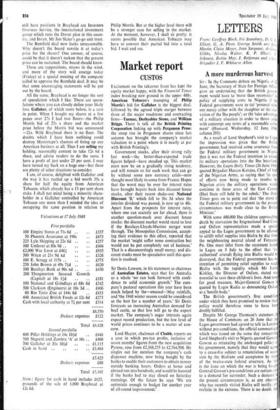A more murderous harvest
From: Geoffrey Birch, Iris Stansbury, Dr C. G Elliott, G. A. Picot, George Smith and John Martin, Claire Meyer, Jean Sargeant, Andiont Gibbs, Nicolas Walter, K. P. Dbank, Johnsen, Robin May, J. Betieman and others, Brigadier J. F. Whitacre Allen.
Sir: In the Commons debate on Nigeria of 12 June, the Secretary of State for Foreign Affairs gave an undertaking that the British govern. ment would have to 'more than reconsider' its policy of supplying arms to Nigeria if the Federal government were to (a) 'proceed with. out mercy either with the slaughter or the star. vation of the Ibo people'; or (b) 'take advantage of a military situation in order to throw aside with contempt any terms of a reasonable settle. ment' (Hansard, Wednesday, 12 June 1968, column 293).
As a result of Lord Shepherd's visit to Lagos the impression was given that the British government had received some assurance from the Federal military government in Nigeria that it was not the Federal intention to extend its military operations into the Ibo heartland. However, the Lagos Daily Times (26 June 1968) quoted Brigadier Hassan Katsina, Chief of Stall of the Nigerian Army, as saying that 'in spite of efforts now being made to resolve the Nigerian crisis the military operations would continue in those areas of the East Cent (Ibo) State still held by the rebels.' The Daily Times goes on to point out that 'the stand of the Federal military government in the present circumstances was made clear to the British Minister.'
With some 400,000 Ibo children approaching death by starvation the Intgrnational Red Cm and Oxfam representatives made a special appeal to the Lagos government to be allotted to airlift relief supplies into Biafra by day from the neighbouring neutral island of Fernando Po. One must infer from the statement issued in Lagos on 5 July to the effect that 'un- authorised' aircraft flying into Biafra would destroyed, that the Federal government has no intention of permitting relief supplies to rear_ Biafra with the rapidity which Mr Lesl Kirkley, the Director of Oxfam, stated wa essential to save these children's lives. And now for good measure, Major-General Gowon quoted by Lagos Radio as denouncing Oxfa as a 'hostile body.'
The British government's first conditio under which they have promised to review thei policy would therefore seem to have bee doubly fulfilled.
Despite Mr George Thomson's statement i the House of Commons on 26 June that th Lagos government had agreed to talk in Londo without pre-conditions, the official communiqu which was issued on the same day concernin Lord Shepherd's visit to Nigeria quoted Genera Gowon as reiterating the unchanged policy 0 his government, namely that they would agr to a cease-fire subject to renunciation of sece sion by the Biafrans and acceptance by the of the twelve-state federal structure. As thi is the issue on which the war is being fough General Gowon's pre-conditions are tantamoun to a demand for surrender. Such a demand i the present circumstances is, as any observe who has recently visited Biafra will testify, a realistic in the extreme. There is no doubt tha it amounts to a contemptuous rejection of 'any terms of a reasonable settlement' and fulfils the second condition for a review of our arms
ficy. Geoffrey Birch
The Holborn College of Law, Languages and Commerce, Red Lion Square, London WC1







































 Previous page
Previous page